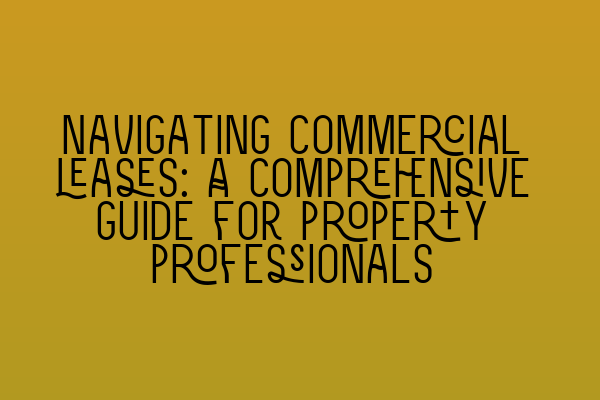Navigating commercial leases: A comprehensive guide for property professionals
Welcome to SQE Property Law & Land Law! As experts in property law, we understand that commercial leases can be complex and daunting for property professionals. It is crucial to have a thorough understanding of the intricacies involved in navigating commercial leases to ensure a smooth and successful process.
In this comprehensive guide, we will walk you through the key aspects of commercial leases, providing you with the knowledge and insights you need to tackle any challenges that may arise. Whether you are a solicitor, property manager, or investor, this guide will equip you with the tools to navigate commercial leases with confidence.
1. Understanding the Basics
First and foremost, it is essential to have a solid understanding of the basics of commercial leases. A commercial lease is a legally binding agreement between a landlord and a tenant, specifying the terms and conditions for the use and occupation of a commercial property. It is crucial to have a clear grasp of the different types of commercial leases, such as full repairing and insuring leases, leases with options to renew or break, and leases with turnover rent provisions. This knowledge will enable you to tailor lease agreements to meet the unique needs of your clients or business.
2. Negotiating Lease Terms
Negotiating lease terms is a critical aspect of the commercial leasing process. It is crucial to protect the interests of your clients or business by carefully reviewing and negotiating key provisions such as rent, lease length, rent review mechanisms, repair obligations, default clauses, and break clauses. Having a thorough understanding of the law and precedents is key to ensuring fair and advantageous lease terms. Stay updated with recent legal challenges in property transactions to effectively navigate negotiations and avoid common pitfalls.
3. Rent and Rent Review
Rent is a fundamental component of a commercial lease. Understanding how rent is calculated and the mechanisms for rent review is crucial. Rental values can be influenced by factors such as market conditions, location, supply and demand, and economic trends. It is vital to stay informed about market trends and have a solid understanding of rental valuation methodologies. Regularly reviewing and negotiating rent is essential to ensure that both the landlord and the tenant are fairly represented.
4. Repair and Maintenance
Commercial leases typically impose repair and maintenance obligations on the tenant. As a property professional, it is essential to understand the extent of these obligations and the impact they can have on your clients or business. Carefully drafting repairing clauses and analyzing repair responsibilities can help mitigate disputes and minimize costs. Familiarize yourself with case studies in property law to gain valuable insights into real-world scenarios and how repairs and maintenance have been addressed.
5. Termination and Renewal Options
Lease termination and renewal options can play a significant role in the long-term success of a commercial lease. Understanding the intricacies of lease termination provisions and negotiating favorable renewal terms are crucial. Lease breaks and options to renew can provide flexibility and security for both landlords and tenants. Be sure to consult professionals well-versed in land law to ensure your lease termination and renewal provisions are legally sound.
6. Environmental Considerations
In an era where environmental sustainability is paramount, it is essential to consider the environmental implications of commercial leases. Balancing development and sustainability is crucial for long-term viability. Familiarize yourself with environmental ethics in land law to gain insights on how to ensure a responsible and sustainable approach to property transactions. Incorporating sustainable practices in lease agreements can benefit both the landlord and the tenant, enhancing the property’s value and reputation.
7. Seeking Professional Advice
Navigating commercial leases can be complex, and seeking professional advice is highly recommended. The expertise of a property solicitor can prove invaluable in interpreting complex lease terms, negotiating favorable agreements, and addressing legal challenges that may arise during the leasing process. Work with a solicitor who specializes in property law to ensure that your commercial leases are legally compliant and advantageous.
In conclusion, navigating commercial leases requires a robust understanding of the law, attention to detail, and effective negotiation skills. By familiarizing yourself with the key aspects of commercial leases, staying updated with legal challenges, and seeking professional advice when necessary, you can confidently navigate the leasing process. Visit SQE Property Law & Land Law for further resources on property law and land law, including valuable revision tips and case studies.
Related Articles:
– Legal challenges in property transactions: A comprehensive guide
– Dominate Property Law Questions: Avoiding Common Pitfalls
– Land Law Revision Tips: Ace Your Exam Preparation
– Environmental Ethics in Land Law: Balancing Development and Sustainability
– SQE case studies in property law: Real-world scenarios
